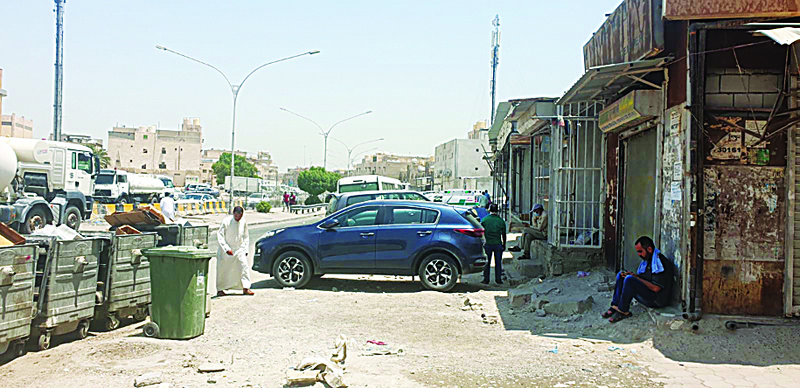
By Ben Garcia
KUWAIT: After nearly a hundred days of lockdown and a week after the government finally reopened the area - how is Jleeb Al-Shuyoukh now? Kuwait Times visited the area - known to many as Hasawi or Abbasiya - and found most of the barbwire placed on the dividers of roads is still in place. Only the police checkpoints have been removed. The life of many people in the area is not yet normal and they are searching for jobs. Although many have returned to work, others however are not yet permitted by their employers to return to their jobs. Kuwait Times spoke to several people and businesses in Jleeb to gauge their sentiments.
Some people sitting in side streets complained they have no work - some of them were fired, but many are waiting for the go-ahead from their companies to resume work. They said they are ready to work even in construction to earn money just to survive. "I lost my job and I don't have anything right now. Thank God I survive every day because my friends are supporting me. I want to find work as soon as possible because I have a family in Egypt to support," said Ahmed, an Egyptian waiting by the roadside for someone to hire him for any construction job.
"I will try to apply to companies that need my services. I used to work in a small shisha cafe in Jleeb, but they closed in March. They told me to look for a new job because they are not going to open anymore. But very few companies are hiring new staff, and just to make some money, I am waiting for transport to take me to Kuwait City to do a construction job. I don't mind it as long as I get some money," he said.
Ahmed's friend Osama works in Shuwaikh, but he said his job is very irregular and he gets only half his salary. "I work in an office in Shuwaikh, but my boss told me to come every other day with half the salary. I also didn't get paid since March. From July, they told me I will receive only half of my salary since there are few customers and we are three on the job, so we will work in rotation," he said. "So I am trying to use some of the days off to work extra - I need money; my family needs money too. That is why I told my friend to accept extra work even if it's unrelated to our jobs," he said.
Not allowed to work
Rubel, a Bangladeshi cafeteria worker, said he hasn't been allowed to work till now. "I am working in Sharq as an office tea boy. They told me not to come to work - maybe they are afraid I might have coronavirus since I reside in Jleeb. Since April, I have no job and no salary. I want to work, but no work is available," he rued.
Noel Panotes, a Filipino working in a furniture company, resigned before the lockdown. He wanted to leave Kuwait, but as he waited to collect his indemnity, he was trapped by the lockdown, forcing him to remain in Kuwait. During the lockdown, his company told him to leave the company accommodation and he was forced to look for anyone who could give him shelter before he leaves Kuwait.
"I was forcibly evicted by my company from the accommodation and I could not do anything about it. I stayed four years with the company, but since they were not giving us salary on time and hadn't paid me for four months, I resigned. But while waiting for the unpaid salary and the indemnity, I was caught in the lockdown, so I stayed at the accommodation," he told Kuwait Times.
"But they told me to leave the company accommodation in the middle of the pandemic in May, so I looked for a place to temporarily stay until I am able to leave Kuwait. The embassy is helping me with repatriation, and I hope I will be able to leave soon. Till now I am here in Jleeb with a family that was kind enough to accept me. During the lockdown, I survived because of some help from other people. I hope to go home soon," Panotes added.










